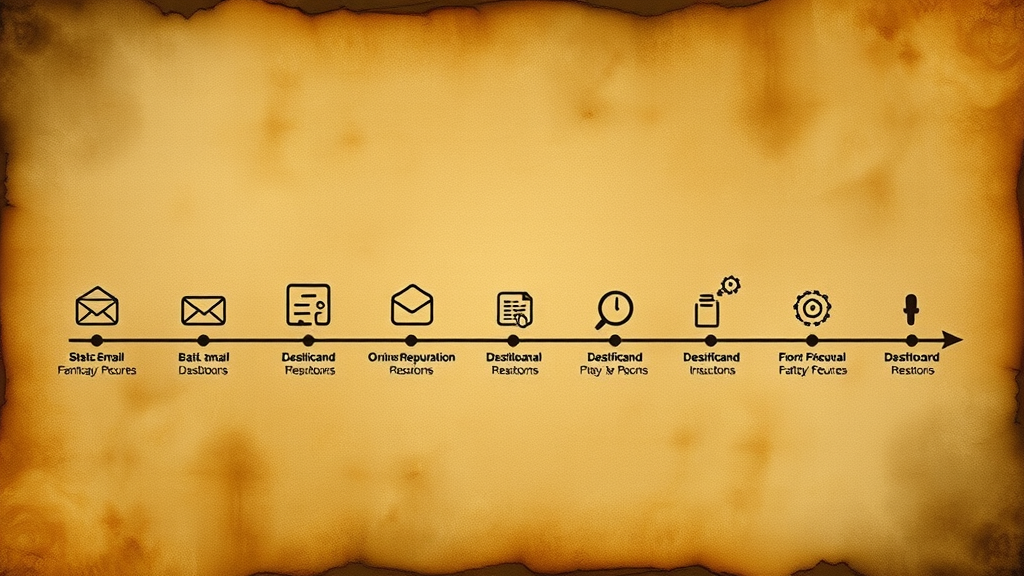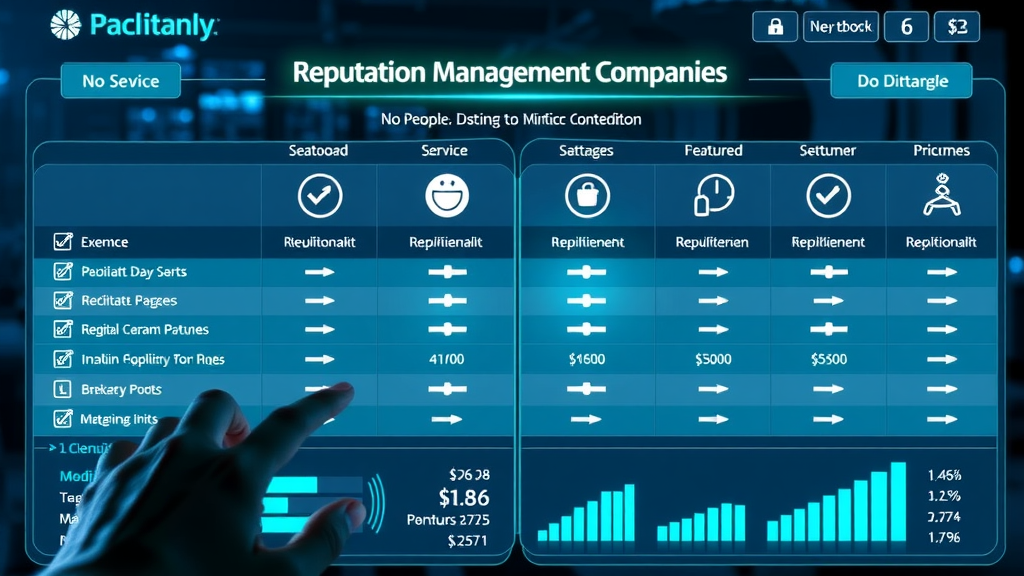
Did you know that 92% of consumers check online reviews before making a purchase ? Or that one bad result on Google can cost a business a third of potential customers? In a world where a single negative review or social post can impact your future, online reputation management isn’t just important—it’s essential. This guide reveals how to defend yourself, outsmart negativity, and become a master at managing your online reputation now.
Why Online Reputation Management Matters in Today’s Digital World
- Startling statistics: 92% of consumers check online reviews before making a purchase; 1 in 3 businesses report losing customers from just one negative search result.
The speed at which information circulates today means your brand is constantly being judged—often by strangers. From online reviews on top review sites to viral social media posts, the internet never sleeps when it comes to reputation. With search engines serving up instant search results, one negative review or an unfavorable news story can sit prominently for the world to see, costing you revenue and trust. This is why mastering online reputation management is crucial for both individuals and companies.
Your online presence is more than just a collection of web pages; it’s the sum of every interaction and piece of feedback left in the digital realm. Potential customers are making decisions based almost exclusively on what they find in search engine results and review sites. That’s why proactive management—monitoring, responding, and building positive online narratives—has never been more vital. By effectively managing your online reputation, you safeguard your business, attract opportunities, and maintain consumer trust against negative content and reviews.

What You’ll Gain: Essential Skills for Effective Online Reputation Management
- Understand the fundamentals of online reputation and reputation management
- Master strategies to suppress negative content and reviews
- Explore advanced online reputation management tactics for individuals and businesses
- Evaluate leading reputation management companies and their effectiveness
By reading this guide, you’ll discover skills to defend your digital footprint and take charge of how the world perceives you or your business. First, you’ll build a foundation in the basics of reputation—knowing what’s at stake and why every review site and mention matters. Then, you’ll learn how to actively respond to and suppress negative reviews, from search engine tactics to review management, and harness advanced social media strategies. Finally, find out how to choose the best reputation management companies , assess their results, and decide when to outsource for maximum impact. Whether you’re a solo entrepreneur or lead a large brand, these proven strategies are essential to thriving in the age of digital transparency.
What is Online Reputation Management? (PAA)
Defining Online Reputation Management
- Explore the core concept of reputation management
- How perception is shaped by online reviews, content, and search engine results
- Difference between individual and business-focused online reputation
At its core, online reputation management means shaping how you or your business appear in search results, social media, and review sites. Think of it as the strategic process of influencing, monitoring, and protecting what shows up about you in search engines and digital platforms. For individuals, this can mean monitoring mentions on social networks and review sites. For businesses, it includes managing customer review feedback, building positive online content, and preventing the spread of negative reviews or damaging stories.

Online reputation management isn’t just about removing negative content—it’s about building a resilient identity that stands strong no matter what’s posted online. While individuals focus on protecting personal and professional digital footprints, businesses have broader concerns, from customer feedback on review sites to social media sentiment and news cycles. Whether you’re trying to hide an old embarrassing post, resolve negative reviews, or simply keep a stellar image, the principles of reputation management apply to everyone in today’s digital-first environment.
The Evolution of Reputation Management Companies
- Role of management companies in modern reputation management
- Growth across industries
- Pros and cons of using reputation management firms
Reputation management companies have evolved from basic review monitoring to become vital allies for businesses and brands. In the early days, managing your online reputation meant deleting bad comments or trying to flood the web with spammy positive articles. Now, management companies offer a sophisticated suite of services—removing or suppressing negative content, optimizing for search engine results, engaging review sites, and providing detailed analytics on online reputation trends. This evolution has made online reputation management more effective but also more complex, requiring businesses to carefully choose their partners.
While working with a management firm can yield impressive results—especially when facing a crisis or persistent negative reviews—there are trade-offs in terms of cost and control. A top reputation management firm often brings industry expertise, established relationships with review sites, experience in public relations, and more extensive technical resources. However, companies must weigh these benefits against the investment and ensure they’re working with trustworthy, transparent partners who deliver measurable search engine improvements, not just promises.

Online reputation management is the strategic process of influencing, monitoring, and protecting what appears about you or your business in online search engines and digital media platforms.
The Cost of Online Reputation Management (PAA)
| Service Type | Typical Monthly Cost | Key Features |
|---|---|---|
| DIY Tools | $0–$149 | Basic monitoring, alerts, review responses |
| Freelancer/Consultant | $150–$999 | Personalized strategy, online content creation, review management |
| Small Agency | $1,000–$4,999 | Comprehensive services, SEO, ongoing monitoring |
| Top-Tier Management Firm | $5,000–$10,000+ | Advanced reputation repair, PR, legal support, global reach |
Online reputation management costs can range from $500 to over $10,000 monthly, depending on service depth, goals, and whether you choose a top-tier management company . The price you pay reflects the complexity of your reputation challenge, the volume of negative content or reviews to address, and the level of expertise required. A solo entrepreneur might manage their brand using DIY tools or basic monitoring services, but companies facing a public relations crisis or large-scale attack on their online reputation may require the full force of a leading reputation management firm.
The main factors influencing cost include the scope of the project (is it a single review site or multiple platforms?), the general reputation and track record of the management company, and whether manual or automated solutions are being utilized. It’s also critical to determine the value of DIY solutions versus fully managed services. While doing it yourself can save money, hiring experts often yields faster, more reliable results—especially in situations where negative content must be suppressed urgently from search engine results.
Does Reputation Management Really Work? (PAA)
Evidence and Case Studies
- Success stories from businesses that improved their online reputation
- Impact on search engine rankings
- How proactive reputation management strategies build trust
Yes, reputation management works— when you have the right strategy and stick to it. Take local businesses that climbed from obscurity to the first page of search results thanks to consistent, positive online review generation and smart SEO. Or consider a brand that weathered a PR crisis by swiftly addressing negative reviews, activating loyal customers, and pushing positive press to the top of search engine results. For companies, a commitment to review management and engaging with customers on social media leads to improved trust and increased sales over time.
Case studies show proactive reputation management does more than bury the bad: it creates a culture of transparency and responsiveness. Companies leveraging smart tactics—promptly responding to every customer review, creating authoritative positive content for their websites, and collaborating with influencers—see real elevation in online presence. The real-world impact includes higher conversion rates, improved Google rankings, and an expanded customer base who trust the brand to deliver on its promises.

“Managing your online reputation is not optional—it's essential in attracting new customers and maintaining loyalty in a digital-first world.” — Leading reputation management company CEO
Effective online reputation management, when done correctly and consistently, is proven to mitigate negative reviews, elevate positive content, and increase overall trust—directly impacting business results.
How to Fix Online Reputation: Actionable Online Reputation Management Strategies (PAA)
Step 1: Conduct a Reputation Audit Using Search Engines
- Searching for negative content and mapping your present online reputation
- Identifying review sites, social media, and search results that feature your business
- Tools for online review monitoring
Your first step in online reputation management is a deep audit of your digital presence. Start by performing searches for your business or personal brand in all major search engines . Review the top 20 search engine results for mentions on review sites, blog posts, news articles, and social media chatter. Map out every positive and negative review, negative content, and all relevant customer feedback. Free tools like Google Alerts and specialty review monitoring platforms can automate some of this process, flagging new mentions or emerging negative reviews in real time.
This upfront audit not only reveals the scope of your online reputation issues but also guides your next actions. If negative content appears on page one of search results, you’ll need both immediate and long-term strategies for suppression and content replacement. Identifying the sources—whether review sites, news outlets, or disgruntled former customers—helps determine whether a DIY approach or partnership with leading reputation management companies is warranted.

Step 2: Respond to Negative Reviews and Build Positive Reviews
- Crafting appropriate responses to negative reviews
- Encouraging positive reviews across key platforms
- Importance of public relations in review management
When faced with a negative review or damaging social media post, never ignore it. Instead, craft a professional, empathetic response that acknowledges the feedback and offers to resolve the issue. This public act of accountability not only helps rehabilitate the relationship with that customer but also signals to potential customers (and search engines) that your brand values transparency and resolution.
Meanwhile, reach out to your satisfied client base and invite them to leave positive reviews on major review sites. Most consumers trust recent feedback more than old reviews or company statements. Building a steady flow of positive online reviews helps push negative reviews further down the page, improving both your overall rating and your search result standing. A dedicated public relations strategy, leveraging both direct communications and media outreach, further enhances your standing across platforms and search engine results.
Step 3: Suppress Negative Content in Search Engine Results
- Generating high-quality, positive online content
- Leveraging blogs, news releases, and authoritative online presence
- Effective use of search engine optimization to shift search results
Suppressing negative content means creating so much positive online material that it outranks the bad in all major search engines. Develop a steady output of high-value blogs, news releases, expert interviews, and brand stories, positioning them to rank above negative reviews or articles. Use search engine optimization best practices (keywords, structured data, link building) to ensure this new content is authoritative and relevant, making it more likely to rise in search results. If possible, claim and optimize profiles on all major review sites, professional directories, and social media platforms—each of these trusted sources has the power to push out negative information.
This layered approach—creating genuine, positive content, and aggressively optimizing it for targeted search engine queries—effectively shifts the balance. Over time, the consistent presence of new, positive online content will systematically relegate outdated or malicious negative reviews and articles further down engine results, protecting your digital reputation for the long term.

Step 4: Social Media Reputation Management in 2024
- Monitoring brand mentions
- Addressing customer review issues in real-time
- Influencer partnerships and reputation repair strategies
Social media is often where reputations are made or broken in seconds. The secret to effective online reputation management in 2024 is real-time monitoring—using advanced sentiment analysis tools to track every mention of your brand and instantly engage with both positive and negative content. When issues arise, reply promptly and transparently, showing the wider audience you’re committed to fixing problems and acknowledging feedback.
It’s equally important to build a positive social media presence proactively. Partner with influencers aligned with your values, develop engaging content that tells your brand story, and interact with your audience regularly. Establish guidelines for your team to handle public relations crises swiftly and consistently, making sure every employee understands the value of review management and digital brand advocacy. Together, these strategies enhance your online presence and protect your reputation from the fast-moving storms of the digital landscape.
Key Features of the Best Reputation Management Companies
How to Choose the Right Reputation Management Company
- Criteria: proven online reputation management skills, cost, service range, transparency, relationships with review sites
- Evaluating management companies’ success with negative content removal
Selecting a reputation management company is about more than picking the biggest name—it’s about finding a partner with a proven history in online reputation management and the right mix of skills for your situation. Look for companies that offer transparent pricing and a clear breakdown of services, from negative content suppression and SEO to review management and ongoing monitoring. A leading reputation management firm will also have established connections with top review sites, social media platforms, and legal teams should content removal become necessary.
Be sure to ask for case studies proving their ability to shift search engine results and improve overall online reputation. The best companies offer both immediate solutions for urgent issues and comprehensive long-term strategies that scale with your needs. Transparency, regular communication, and a focus on measurable results are non-negotiable. Compare firms based on unique solutions, specialization in your industry, and the value of their public relations or crisis management resources.
| Company | Specialties | Key Solutions | Pricing (Monthly) |
|---|---|---|---|
| ReputationDefender | Individual and Business | Negative content removal, SEO, privacy protection | $2,500–$10,000 |
| NetReputation | Small Business & Enterprise | Online review repair, content suppression, brand monitoring | $1,500–$7,500 |
| BrandYourself | Individuals, Coaches, Executives | Online reputation building, personal branding, DIY tools | $99–$499 (DIY), $999–$5,000! |
| WebiMax | Enterprise | PR crisis response, review management, search engine optimization | $5,000–$15,000 |

When to Outsource to a Reputation Management Agency
- Scenarios favoring professional management: crisis, persistent negative reviews, ongoing social media threats
- Scalability and long-term online reputation protection
There are times when managing your own online reputation isn’t enough. If your business faces a high-profile crisis, a coordinated negative review campaign, or an ongoing stream of damaging press, it’s time to consult the experts. Professional reputation management agencies bring the firepower, technology, and in-depth knowledge needed to address and recover from severe threats to your online presence. They leverage advanced SEO, legal takedowns, crisis PR, and proprietary monitoring tools beyond what’s available to the average business.
Even during calmer times, working with a reputable management company can future-proof your digital reputation. They offer scalable solutions, adapting as your business grows and your online presence expands. For individuals, agencies can suppress old negative content and promote your expertise. For organizations, they help align all touchpoints—website, review sites, and social media—to ensure your public face remains positive and authoritative, regardless of what tomorrow brings.
Managing Your Online Reputation: Proactive Steps for Individuals and Businesses
- Building consistent online presence and brand voice
- Encouraging employee advocacy
- Partnering with public relations and review management teams
Staying ahead of reputation issues means adopting proactive habits. Regularly update your website, Google Business Profile , and main review platforms with fresh information and positive content. Empower your employees to act as brand advocates—their genuine voices carry significant influence across review sites and social media. Thoughtful, authentic stories dominate search results when customers (and search engines) see consistent messaging across all your online properties.
Connect with experienced public relations or review management teams who can guide you through both the good times and the unexpected challenges. Their expertise not only helps craft winning narratives but also proactively defends against future issues. With the right systems and allies in place, your business or personal brand can weather any digital storm, building a reputation that lasts for years to come.

Common Mistakes in Online Reputation Management—and How to Avoid Them
- Ignoring negative reviews and search results
- Overlooking fake or fraudulent review sites
- Neglecting routine content creation
- Underestimating the reach of social media
The most damaging reputation mistakes are often the easiest to prevent. Ignoring negative reviews or failing to monitor search results allows damaging content to take root and spread. Overlooking suspicious or fraudulent review sites can worsen the problem, as fake reviews often influence both search engines and potential customers. To counter this, establish routines for monitoring key sites, verifying the authenticity of all review platforms, and reporting false claims swiftly.
Consistency in content creation is another vital pillar. A neglected blog, outdated social profiles, or generic website can make negative results more dominant in search engines. Lastly, never underestimate the virality of social media ; a small issue can escalate when ignored, but prompt action can nip reputational threats in the bud. Avoid these mistakes by prioritizing ongoing content development, review management, and real-time online engagement—your digital reputation will be stronger for it.
FAQs About Online Reputation Management
- How long does online reputation management take to show results? Results can be seen in as little as a few weeks for minor issues, but substantial improvements in search engine results and review site ratings can take three to six months of consistent effort. The timeline depends on the severity of negative content and the strategies you employ.
- Are all online reputation management companies equally effective? No. The effectiveness of a reputation management company depends on their expertise, technology, and transparency. Always seek proven results—especially with search engines and review management—and read client testimonials and independent case studies before hiring.
- What’s the role of customer review sites in digital reputation? Customer review sites are critical influencers of online reputation. They dominate the first page of search results and heavily impact potential customers’ perceptions. Consistent engagement and response on these platforms form the backbone of positive reputation management.
Powerful Tools and Resources for Online Reputation Management
- Popular online review monitoring solutions
- Free and paid search engine results alert tools
- Social media sentiment analysis platforms
There are many digital tools available for strengthening your online reputation. Start with review monitoring solutions like Reputology , ReviewTrackers , or Google Alerts to catch new reviews and mentions across countless review sites. Tools like SEMrush , Ahrefs , and Mention allow you to monitor changes in search engine results and receive instant notifications about negative content. For in-depth social media analysis, platforms such as Hootsuite Insights and Brand24 measure sentiment and identify viral threats or opportunities.
Utilizing a blend of free and paid resources provides both a broad and deep view of your online reputation landscape. Pair these tools with a consistent strategy and you’ll be equipped to prevent, detect, and overcome reputation challenges before they can do real harm.

Expert Tips for Sustainable Online Reputation Management Success
- Regularly update Google Business Profile and review platforms
- Promptly address all negative content and reviews
- Ongoing training for front-line staff in digital engagement
Sustainable reputation management comes from ingrained habits. Frequently review your Google Business Profile and make updates as needed—fresh content is favored by both customers and search engines. Respond quickly to all negative reviews to show potential customers that you care. Finally, invest in consistent digital engagement training for your team, ensuring everyone who interacts with customers online can handle tricky situations with expertise and empathy.
This holistic, steady effort over time yields the best long-term results. By institutionalizing these strategies, you not only reduce reputational risks but strengthen your brand’s competitive advantage, turning your online presence into a powerful business asset.

Key Takeaways for Robust Online Reputation Management
- Be proactive, not reactive in managing your online reputation
- Invest in proven online reputation management strategies and tools
- Partner with reputable management companies when needed
Success in online reputation management comes down to forward-thinking strategies, consistent action, and knowing when to call in the experts. Equip yourself with the right tools, partners, and mindset, and you’ll defend your digital name in any climate.
Take Charge of Your Online Reputation Management Journey Today
- Protect your online presence with proven reputation management steps
- Contact a leading reputation management company for a free consultation
- Share this article with others seeking online reputation management solutions
Take decisive steps to strengthen your online reputation now: start with an audit, respond to every review, create positive content, and—if needed—partner with an expert. Don’t let negative content define you or your business—own your narrative, today!
Start auditing your digital presence, respond to feedback, create positive content, and connect with experts for long-lasting online reputation management success.
Sources
- BrightLocal – https://www.brightlocal.com/learn/reputation-management/statistics/
- ReputationDefender – https://www.reputationdefender.com/
- ReviewTrackers – https://www.reviewtrackers.com/
- NetReputation – https://www.netreputation.com/
- BrandYourself – https://www.brandyourself.com/
- WebiMax – https://www.webimax.com/
- Search Engine Journal – https://www.searchenginejournal.com/reputation-management/
To further enhance your understanding of online reputation management, consider exploring the following resources:
- “Reputation Management: How to Protect Your Brand Online” ( blog.hubspot.com )
This article provides insights into reputation management software, offering tools to monitor reviews, track brand mentions, and analyze customer sentiment.
- “Online Reputation Management: Top Strategies for 2024” ( cision.com )
This resource outlines strategies such as monitoring social media mentions, measuring brand sentiment, and engaging proactively with your audience to maintain a positive online presence.
If you’re serious about mastering online reputation management, these resources will provide you with the tools and strategies needed to protect and enhance your brand’s digital image.
 Add Row
Add Row  Add
Add 




Write A Comment